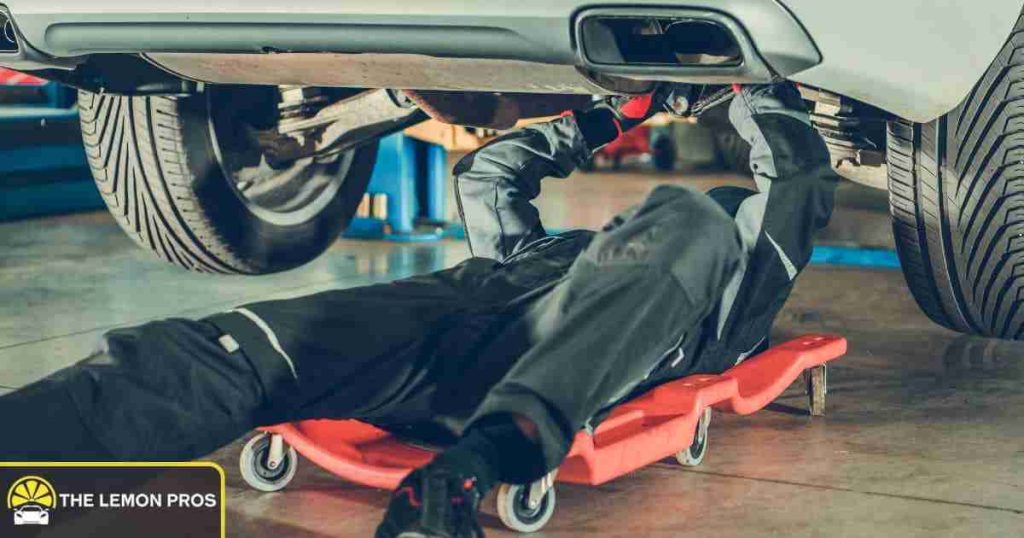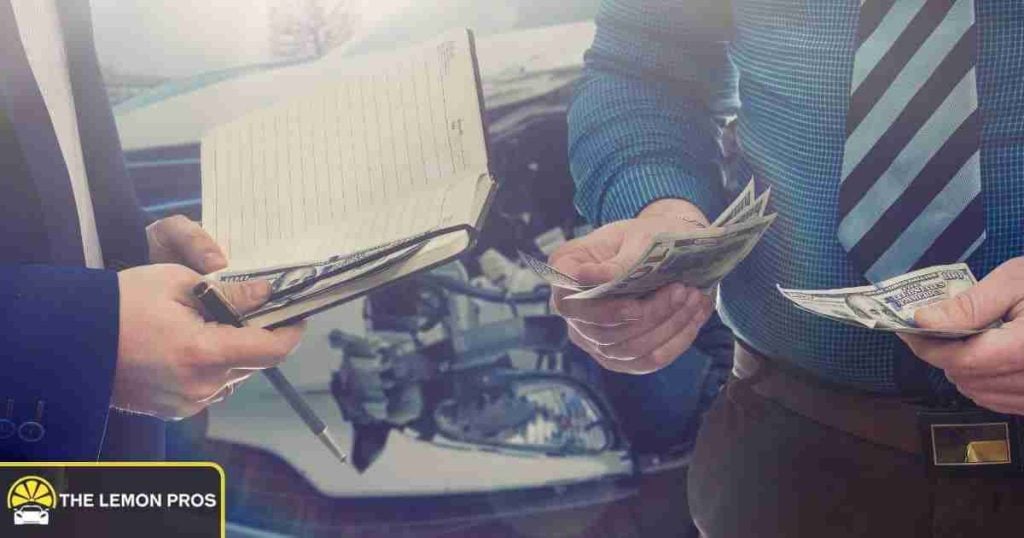
Do Dealerships Get Paid for Warranty Work?
If you have a problem with your vehicle while it’s under the factory warranty, you can generally expect the dealership to foot the bill. So, how do the service technicians/departments get paid for their work? Will you need to put out any money for warranty work or is everything covered? In simple terms, the dealership receives reimbursement from the manufacturer for all warranty work. You shouldn't have to pay a penny for covered components.
If you are stuck with a lemon vehicle and are struggling to understand what to do, our expert California Lemon Law Attorneys can help you! With thousands of satisfied clients, our team of professional car warranty lawyers can help you understand the ins and outs of warranty repairs and compensation. Get your free Lemon Law Consultation today and let us help you get the compensation you deserve!
In this blog, we will examine the basics of an automotive warranty and how the dealership gets paid for warranty work.
Table Of Contents
- Basics of Automotive Warranties in California
- Do Dealerships Get Paid for Warranty Work?
- Does the Type of Warranty Matter?
- How Much Can You Expect to Pay a Dealership Service Department?
- What's the Impact of Factory Warranty Work on Dealerships?
- What's a Consumer’s Perspective on Warranty Repairs?
- Can Dealerships Decline Warranty Claims?
- How Can a Car Warranty Lawyer Help?
- Are You Having Issues Fixing Your Car Under Warranty?
- FAQ
- How Do Dealerships Get Paid for Warranty Work?
- How Does Warranty Work Affect Car Owners?
- Do Dealers Make Money on a Warranty Repair?
- Who Reimburses the Dealership for Warranty Repairs?
- When Is Warranty Work Not Covered?
- What Are Some Tips About Warranty Repairs at Dealerships?
- Should I Buy a Service Contract on a Used Car?
- What's the Average Monthly Cost of an Extended Car Warranty?
Basics of Automotive Warranties in California

An automotive warranty assures consumers that the manufacturer will repair or replace any covered defects within a specified period. It serves as a guarantee of quality and reliability, offering peace of mind to car buyers.
In the auto industry, warranties come in several different types, each covering various vehicle elements. The most common automotive warranties include the following:
- Basic (bumper-to-bumper) warranty: Covers defects in materials or workmanship for a specified warranty time, usually three years or 36,000 miles, whichever comes first. This warranty only covers the components that were originally on the vehicle, not the aftermarket parts that were later installed. It also doesn’t cover consumables, such as brakes, windshield wipers, or tires.
- Powertrain warranty: Focused on the major components (engine, transmission, and drivetrain), this warranty tends to last longer than the basic coverage.
- Extended warranty: Optional protection purchased separately, either through the manufacturer or a third party. This warranty extends the original protection term. Depending on the company, certain service contract providers may be recommended for repairs.
- Rust/corrosion warranty: Coverage for rust or corrosion damage on specific components.
- Emissions warranty: Mandated by law in some states for emission-related components.
- Hybrid/electric vehicle warranty: Specialized systems are covered for longer than the typical basic coverage.
However, how long can a dealership hold your car for repair in California? Per incident, the dealership has thirty days to repair the problem under California Lemon laws. The 30-day limit is per problem, not per visit. Therefore, if the car is in the repair shop three times for the same problem, it must be repaired within thirty days across those three visits.
Do Dealerships Get Paid for Warranty Work?

Yes, the dealership receives reimbursement from the manufacturer for all warranty work, but the process varies depending on the warranty and dealership agreement. The cost of parts and the mechanic’s labor are paid for. However, the manufacturer may not cover the full costs, especially for complex or time-consuming work.
The dealership service department is responsible for maintaining and repairing vehicles, whether they were sold at that location or not. Technicians are typically trained by the manufacturer, ensuring they understand the mechanics of that brand. These technicians may be paid a certain retail labor rate per hour or could be reimbursed a flat rate for each particular job. They are joined by the service advisors, who interact with the customer and recommend appropriate repairs or maintenance. The Service manager oversees the entire operation and coordinates the workflow. This person answers directly to the general manager or dealership owner.
In some cases, mechanics may receive lower compensation rates for warranty work compared to customer-pay repairs. This is because warranty work typically involves standardized repair times and reimbursement rates set by the manufacturer. These rates may not always align with the actual time and effort required to complete the repair. For example, if a job is slotted for two hours, but it takes the technician three hours instead, the manufacturer is only paying the labor rates for the two that were recommended. Any additional labor hours receive no compensation.
Does the Type of Warranty Matter?

Paid-for-service contracts pay differently than the factory warranty. Instead of being charged a lesser rate, the service contract pays the dealership, just as if it were a customer. No money is lost during these repairs, so they are more desirable to the technician than warranty work.
Because most service contracts only kick in once the manufacturer’s warranty has expired, they provide no benefit during the factory warranty period. For the majority of lemon repairs, the factory warranty pays the bill.
Extended warranties can be paid out in several different ways. The customer sometimes pays the dealership to perform warranty work and gets warranty reimbursement later. In other cases, warranty reimbursements are sent directly to the dealer and you pay nothing out of pocket.
How Much Can You Expect to Pay a Dealership Service Department?

The manufacturer pays the cost of warranty work at a dealership. Under warranty, customers should not have to pay for parts or the labor rate associated with covered repairs. However, retail customers may be responsible for the costs if the warranty does not cover certain repairs or if the vehicle is out of warranty. Warranty coverage may be subject to certain limitations, such as mileage or time constraints.
California has passed several regulations and laws aimed at keeping manufacturers from taking advantage of consumers. These include the following:
- Song-Beverly Consumer Warranty Act (California Civil Code Sections 1790 et seq.): Known as the California Lemon Law, this protection is for purchasers or leasees of new or used vehicles with warranty defects.
- California Business and Professions Code Section 9884.9: This law requires automotive repair dealers (including dealerships) to provide written estimates for repairs and obtain authorization from the consumer before proceeding with any repairs not covered by warranty.
- California Code of Regulations, Title 16, Section 3371: This regulation prohibits unfair or deceptive acts or practices by automotive repair dealers, including misrepresenting the need for repairs, charging for repairs that were not authorized by the consumer, or charging for repairs covered by warranty.
- California Code of Regulations, Title 16, Section 3351: This regulation requires automotive repair dealers to provide consumers with an invoice that itemizes the parts and labor costs for repairs performed, including any warranty repairs.
- California Code of Regulations, Title 16, Section 3353: This regulation requires automotive repair dealers to retain copies of all invoices and repair orders for a minimum of two years. These records must be made available to the Bureau of Automotive Repair (BAR) upon request for inspection and audit purposes.
With these laws and regulations in place, the consumer is better protected from deceptive business practices and lemon vehicles. Most states have similar laws, but the regulations and time periods may be different.
Ultimately, what is a warranty claim and how is the consumer reimbursed? If the warranty is through the manufacturer, the participating dealership handles the claim; there’s nothing you need to do. However, if you have an extended warranty through a third party, you may be responsible for paying the repair bill out of pocket and submitting for reimbursement through the company within a certain amount of time.
What's the Impact of Factory Warranty Work on Dealerships?
The service department isn’t usually thrilled with warranty work, especially the technicians who get paid a lower rate for these repairs. For this reason, many dealerships will spread the warranty jobs out among regular (paid-for) work, ensuring it is fair for all technicians.
However, can a car dealership cancel a contract in California? California has a 10-day rule on used cars that offers further protection. Here are some essential guidelines:
- Used Vehicle Purchases: If a consumer purchases a used vehicle from a dealership, the dealership must offer the consumer a two-day contract cancellation option called the “two-day cooling-off period.” This allows the consumer to return the vehicle within two days of purchase for any reason and receive a full refund of the purchase price.
- Additional 10-Day Rule: In cases where the dealership violates certain provisions related to the sale of a used vehicle, such as failing to provide a proper warranty or disclose certain information, the consumer may have an additional 10 days after the two-day cooling-off period to cancel the contract and return the vehicle for a refund.
What's a Consumer’s Perspective on Warranty Repairs?

As a consumer, you have the right to have your warranty work performed in a timely manner without excessive delays. Because the dealership doesn’t get paid the same amount, warranty work will often wait and be neglected, but that’s not allowed by law. Dealerships also lose customer satisfaction and suffer from poor reviews if they choose to prolong the repairs. Warranty repair work should never be put on the back burner, and keep in mind that your car could be classified as a lemon vehicle if the repairs aren’t completed within thirty days.
Can I return a used car I just bought from a dealer in California? Yes, there is a two-day cooling-off period that allows you to return the car if you change your mind. Additionally, you may be able to qualify for a replacement or reimbursement over a longer period, such as when you drive a lemon car.
What is the Lemon Law for replacement cars in California? The manufacturer can give you a replacement car that’s identical to the one you turned in. If a replacement isn’t found, cash reimbursement may be offered instead. Does your car qualify as a lemon? Speak to one of our professionals to find out.
Can Dealerships Decline Warranty Claims?
Dealerships do have the discretion to turn down certain warranty claims. While the manufacturer does reimburse the dealership for the repair order, the payment is decided by the "book time" that the job typically takes. If the repair proves to be more complex than what the manufacturer is going to pay, the dealership would be expected to absorb that cost.
Even if the dealership doesn't outright deny the repair, they may discourage certain claims by extending the wait times, suggesting service is better elsewhere or requiring additional documentation.
How Can a Car Warranty Lawyer Help?

Car warranty lawyershave in-depth knowledge of the consumer rights surrounding factory warranties. While you may not know exactly what you're entitled to, a Lemon Law lawyer will. Not only can we negotiate with the dealership and manufacturer on your behalf, but we also make sure you get everything you deserve. We can ensure the manufacturer pays for your time and troubles.
The best part is that most lawyers work on a contingency basis. That means you pay nothing to the lawyer unless you win your case. With a free consultation, you may not have to pay any attorney fees out of pocket.
Not only can we start a Lemon Law claim for your unrepaired car, but we can also help you contact various consumer complaint companies. You want to file with not only the Better Business Bureau (BBB), but also the Bureau of Automotive Repair (BAR). The BBB and Bureau of Automotive Repair complaints help other consumers avoid troubles in the future.
Are You Having Issues Fixing Your Car Under Warranty?
When you have warranty work performed at the dealership, it’s vital that the dealership is transparent and fair. You deserve to have the manufacturer's defects fixed just as much as the customers who are paying for repairs. If these repairs aren’t completed in a timely manner, you may be due compensation.
As a consumer, it’s essential to remember that dealership operations can be complicated. While your consumer rights are necessary, there’s a balance between getting what you are owed and being respectful of others. That’s why it helps to bounce the situation off our professionals before taking action.
As one of the leading Lemon Law Attorney practices in Beverly Hills, our Lemon Car Lawyer in California can help you get what you deserve. With thousands of satisfied clients already winning the battle against manufacturers, our team is ready to help you. Get your free Lemon Law Consultation today.
FAQ
How Do Dealerships Get Paid for Warranty Work?
The manufacturer reimburses the dealership for parts and labor at pre-approved rates. The customer doesn't need to pay for any of the work, as long as the repair is covered by the warranty.
How Does Warranty Work Affect Car Owners?
While warranty work is usually free for the driver of the vehicle, there could be delays or coverage disputes that can cause frustration. It can be challenging to have a warranty claim paid for with extended coverage as well.
Do Dealers Make Money on a Warranty Repair?
Yes, but sometimes it is less than when the customer pays the normal labor rate per hour. Manufacturers only pay the "book time" for a job, which can be far less than what it takes a technician to perform.
Who Reimburses the Dealership for Warranty Repairs?
The manufacturer pays for the warranty repair if it is covered by the factory warranty. With extended warranty coverage, the provider pays to fix the car.
When Is Warranty Work Not Covered?
Most warranties don't cover consumable items, such as windshield wipers and brake pads. The claim may also be denied if there were modifications made that contributed to the failure, misuse of the vehicle or neglect by the driver.
What Are Some Tips About Warranty Repairs at Dealerships?
The document is paramount, so you want to get everything in writing just in case a dispute occurs. You should also ask the mechanic or service advisor a lot of questions and continue following up with the dealership on the status of your vehicle.
Should I Buy a Service Contract on a Used Car?
It depends on your situation. Extended car warranties can help you avoid the cost of unexpected repairs, but most people find that they cost more than what is ever needed.
What's the Average Monthly Cost of an Extended Car Warranty?
Depending on the coverage, you may only need to spend $100 to $300 per month, which can provide you with peace of mind. Evaluate the different coverage options and providers to see what fits your budget.






